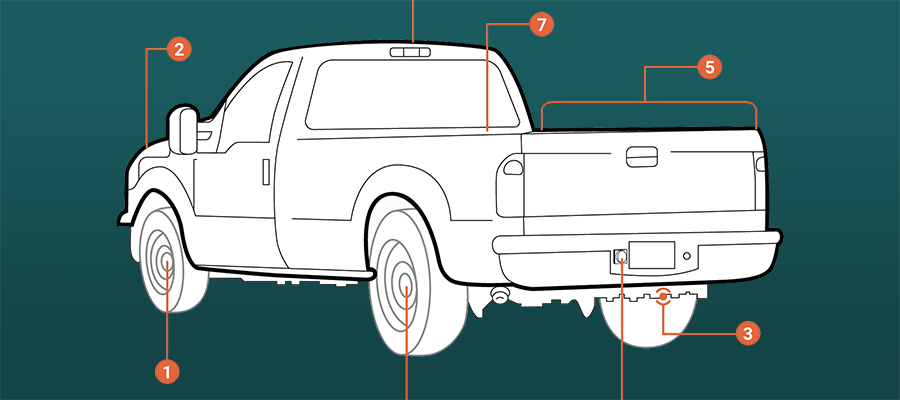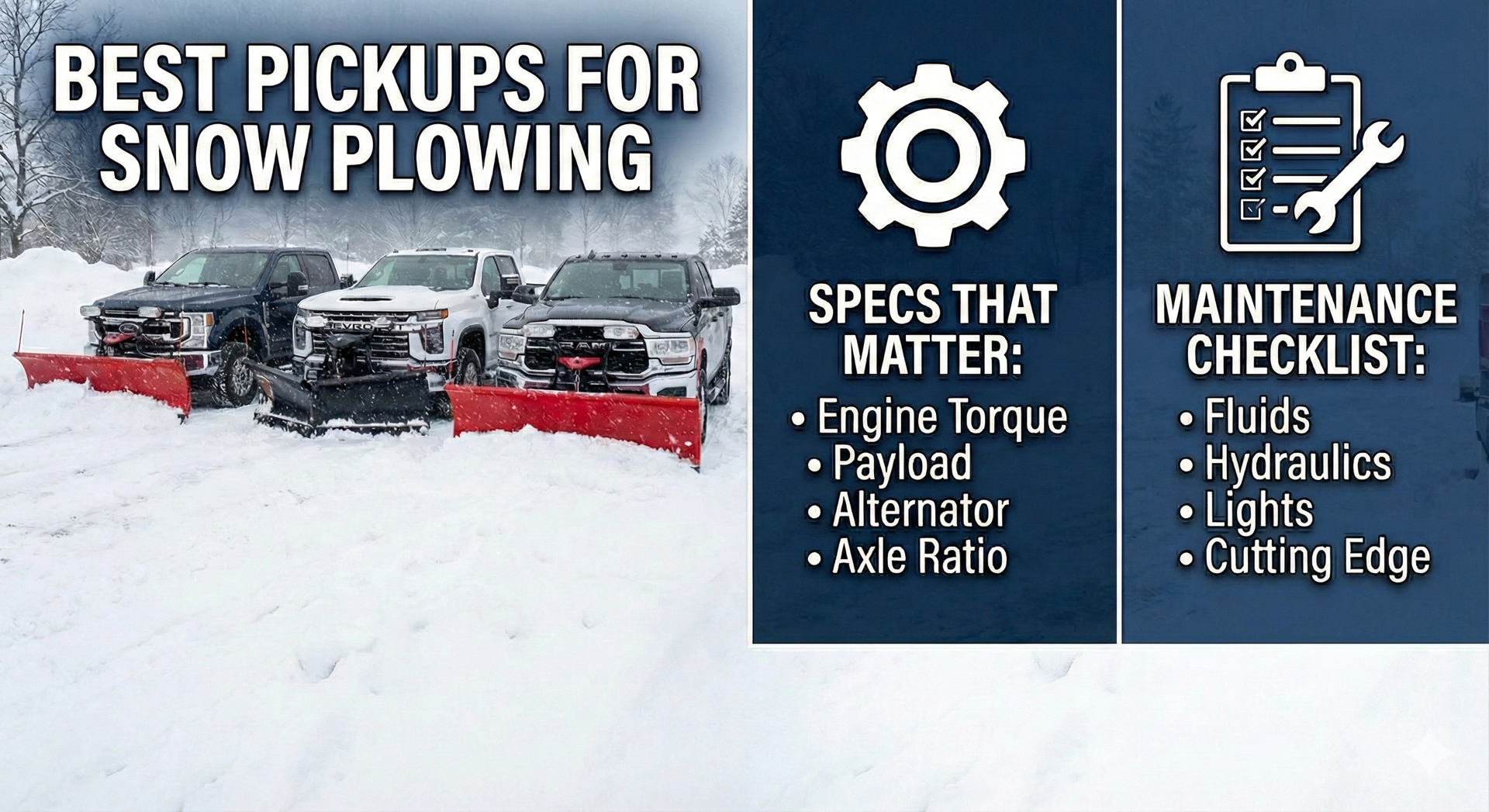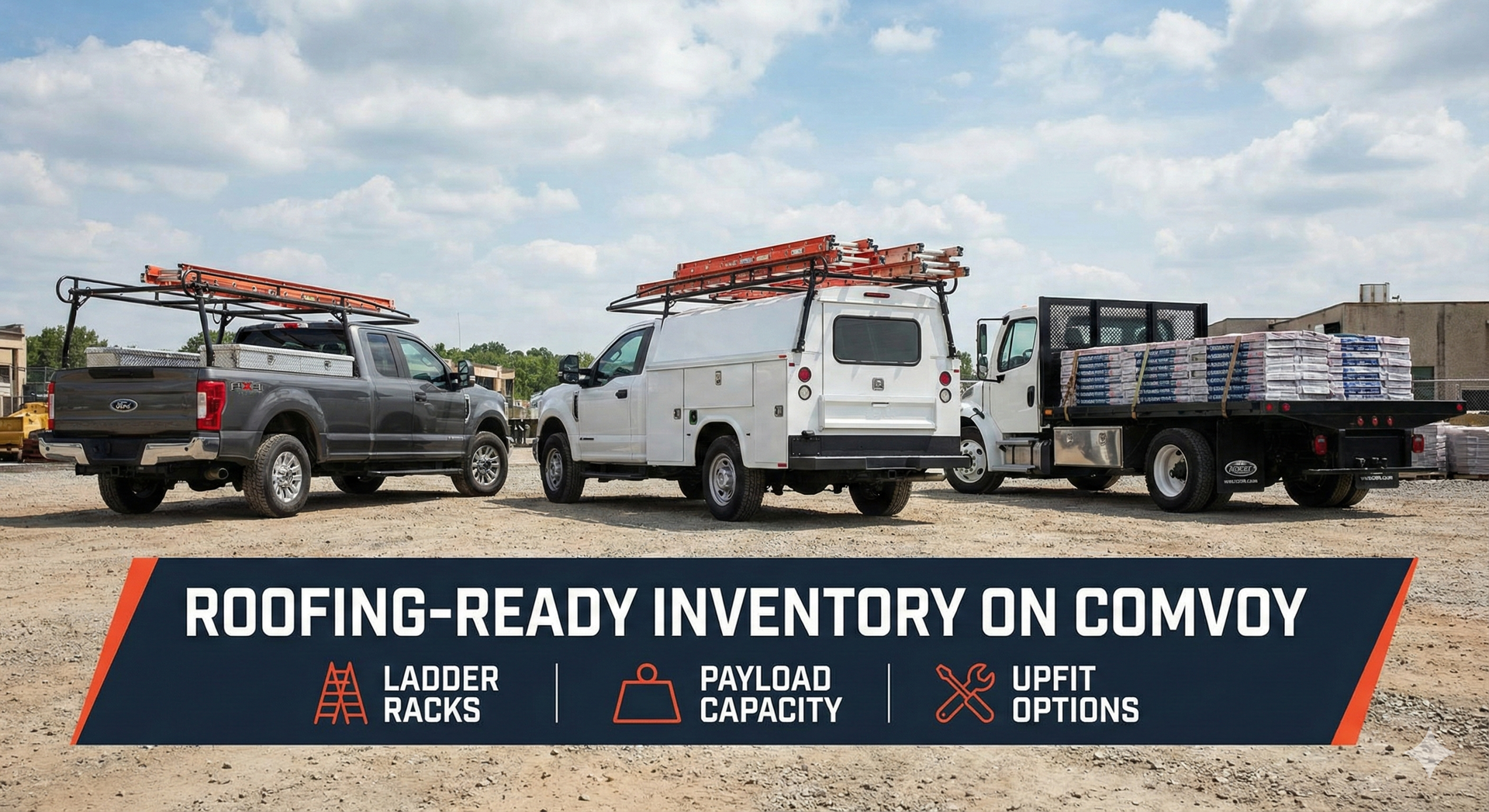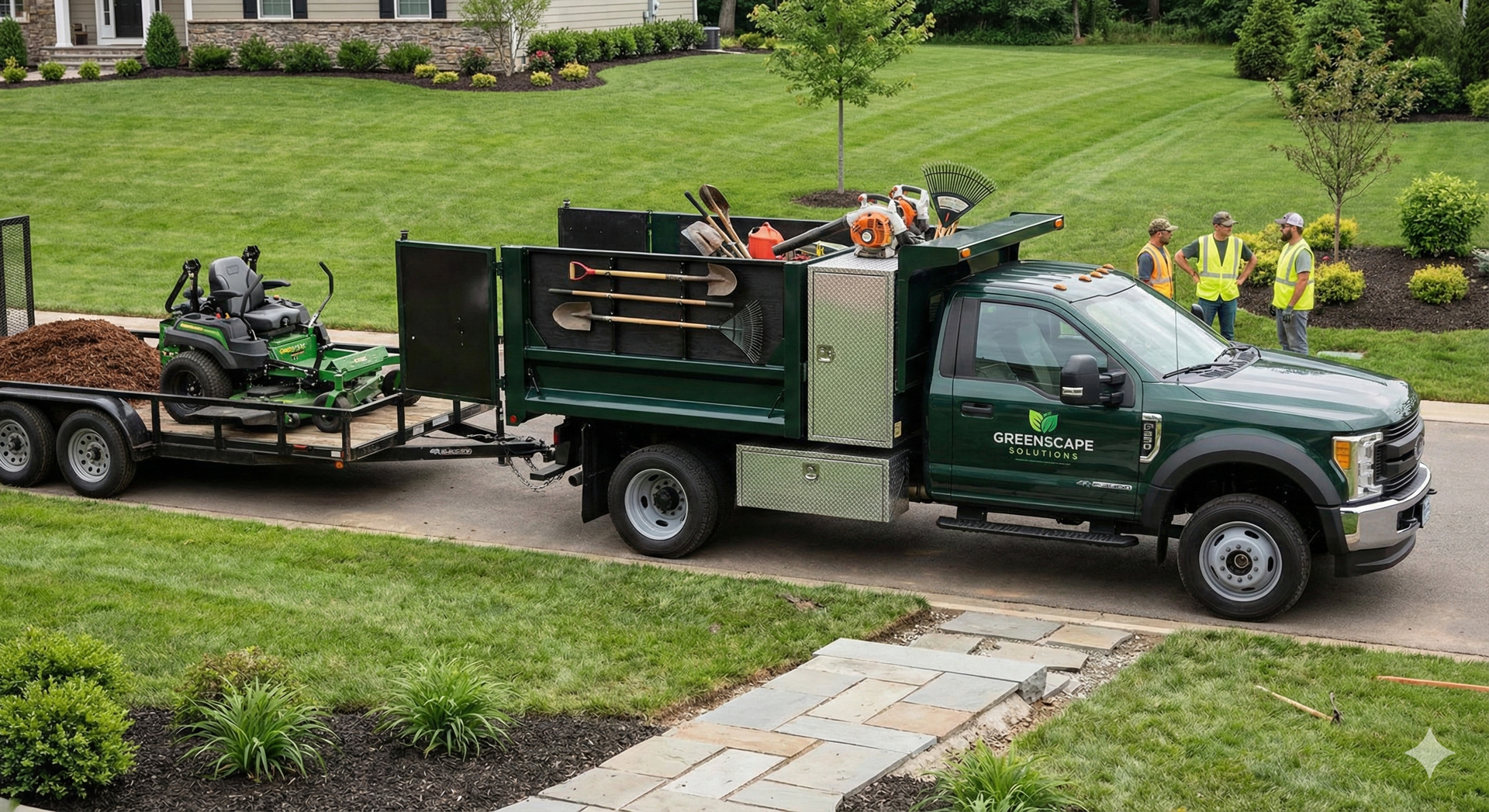Pickup Trucks: The Work Truck Powerhouse


Pickup Trucks: The Work Truck Powerhouse
Pickup trucks feature countless configurations in the drivetrain, fuel options, interior, bed, and wheelbase dimensions. This versatility makes commercial pickup trucks the working person’s ideal commercial vehicle, both on and off the clock. If you’re looking to add one or more pickups to your business fleet, consider the following features so your next addition is equipped to do the job you need it to do.
Types of Pickup Trucks

Compact and Midsize Pickups for Business Use
Compact and mid-size pickup trucks can be a valuable addition to a fleet primarily composed of full-size trucks, serving specific needs within a business. They are particularly well-suited for situations where heavy hauling isn't a primary requirement, but the flexibility of a truck bed and better fuel mileage are still beneficial. Consider these use cases:
- Senior-Level Employee Vehicles: A compact or midsize truck offers a comfortable and practical vehicle for senior staff or management who don't regularly haul large cargo. It provides the flexibility to transport smaller items, equipment, or materials when needed without the bulk, cost, and fuel consumption of a full-size truck.
- Client Transportation: These trucks can be a more professional and comfortable option for transporting clients to and from job sites, meetings, or other business-related locations, compared to a standard car. The added utility of a truck bed allows for transporting small samples, presentation materials, or other items related to the client visit.
- Site Inspection and Supervision: A compact or midsize truck offers the perfect balance of fuel mileage and utility for site supervisors or inspectors. Job sites are often far apart, so the fuel savings combined with the capability to carry tools, samples, or inspection equipment make smaller pickups a good fit for this role.
- Support Vehicle: In a fleet dominated by full-size trucks dedicated to heavy lifting, the smaller pickups can act as support vehicles. They can be used for errands, transporting personnel between sites, or delivering smaller, time-sensitive items.
In these scenarios, the compact and midsize pickups offer a cost-effective and efficient solution, reducing fuel consumption and wear-and-tear on the larger trucks in the fleet while still providing the necessary utility for specific tasks.
Full-size Pickups as Work Trucks
Full-size commercial pickup trucks are the versatile workhorses of the business world, bridging the gap between everyday usability and serious hauling and towing capabilities. They are a popular choice for businesses that need a work truck that can handle a variety of tasks without the extreme specialization (and cost) of a heavy-duty pickup truck. Here are some common commercial use cases for full-size pickups:
- General Contracting and Construction: Full-size trucks are a staple on construction sites, used for transporting materials like lumber, drywall, and tools. They can also tow trailers with smaller equipment, such as generators, compressors, or skid steers. Their versatility makes them suitable for a wide range of tasks, from site preparation to final finishing.
- Landscaping and Grounds Maintenance: Landscaping companies utilize full-size pickups for hauling plants, mulch, soil, and equipment. They can also tow trailers with mowers, aerators, or other landscaping implements. The truck bed provides ample space for carrying tools and supplies.
- Delivery and Light Logistics: For businesses that need to transport moderately sized or bulky items, full-size pickups offer a good balance of cargo space and maneuverability. They are used by businesses like appliance stores, furniture stores, and smaller delivery services.
- Maintenance and Repair Services: Full-size trucks are ideal for mobile maintenance and repair services, such as HVAC technicians, plumbers, and electricians. The truck bed can be outfitted with toolboxes, racks, and other storage solutions to carry all the necessary equipment and parts.
- Property Management and Real Estate: Property managers and real estate agents often use full-size trucks for tasks like transporting signage, delivering materials to properties, and inspecting sites. The truck's versatility allows them to handle a variety of tasks related to property maintenance and management.
- Government and Municipal Services: Full-size pickups are used by various government and municipal departments for tasks like road maintenance, park maintenance, and general transportation. Their durability and versatility make them well-suited for these demanding applications.
Full-size commercial pickups offer a sweet spot between capability and practicality. They provide the muscle for demanding tasks while remaining manageable for everyday driving. This balance makes them a valuable asset for a wide range of businesses that need a work truck that can do a little bit of everything.
Heavy-Duty Commercial Pickup Trucks
Heavy-duty pickup trucks are the titans of the commercial world. The Environmental Protection Agency (EPA) designates any work truck with a GVWR of more than 6,500 pounds as heavy-duty. Commercial pickup trucks are divided into 3 classes; Class 2b (8,501-10,000 lbs), Class 3 (10,001-14,000 lbs), and Class 4 (14,001-16,000 lbs).
Practically speaking, commercial truck classes readily available with a conventional pickup bed are dominated by GM/Chevy HD pickups up to the 3500 line, Ford Super Duty pickup trucks up to its F350 model, and Ram Heavy Duty pickups up to its 3500 models. Most commercial pickup trucks do not exceed 10,000 lb GVWR, but commercial pickups with higher GVWR are available.
Engineered for the most demanding tasks and built to withstand the rigors of constant heavy use, they are the go-to choice for businesses that require more towing and payload capacity, prioritizing raw power and durability over comfort and fuel efficiency. Here are some key commercial use cases for heavy-duty pickups:
- Heavy Construction and Industrial Applications: Heavy-duty trucks are essential on large-scale construction sites, used for hauling massive quantities of materials, towing heavy equipment trailers (think excavators, bulldozers, and backhoes), and even serving as mobile crane platforms. Their robust construction and powerful engines are crucial for these demanding applications.
- Heavy Equipment Transport: Businesses specializing in transporting heavy equipment rely heavily on these trucks. They are used to haul everything from construction machinery to agricultural equipment, often requiring specialized trailers and tie-down systems.
- Mining and Resource Extraction: In mining and resource extraction operations, heavy-duty trucks are used for transporting equipment, and supporting various on-site activities. Their ruggedness and ability to navigate challenging terrain are essential in these environments.
- Oil and Gas Industry: The oil and gas industry relies on heavy-duty pickups for a wide range of tasks, including transporting equipment to remote drilling sites, hauling supplies, and supporting pipeline construction and maintenance.
- Agriculture: Agricultural operations often use heavy-duty trucks for hauling large trailers loaded with crops, livestock, or agricultural equipment and supplies. Their towing capacity and durability are essential for these demanding tasks.
Heavy-duty pickup trucks represent a significant investment, but their capabilities are unmatched when it comes to tackling the toughest jobs. For businesses that depend on hauling and towing extremely heavy loads, these trucks are an essential asset, enabling them to maximize productivity and efficiency.
Click Here for More Information
Finding the Right Commercial Pickup Truck
Finding the right commercial pickup truck for your business involves assessing your needs and priorities. From size and payload capacity to fuel type and drivetrain, each decision will impact the truck's overall cost, capability, and suitability for your operations. Carefully consider the factors outlined in this guide to make an informed choice that will maximize your investment and support the success of your business.
Cab Configuration and Bed Length of Commercial Pickups
When selecting a commercial pickup, businesses must carefully weigh cab configuration and bed length, recognizing the trade-offs involved and what is available in different vehicle size classes.
Cab Configurations and Bed Lengths by Size Class:
- Compact/Midsize Pickups: These trucks offer the least amount of both passenger and cargo space. Cab configurations typically include regular and extended cabs, often paired with shorter bed lengths. The focus here is on maneuverability and efficiency, making them suitable for light-duty tasks and urban environments.
- Full-Size Pickups: In the full-size segment, the choice often comes down to prioritizing either passenger space or cargo capacity. Extended cabs offer increased passenger room but usually come with a shorter bed. Crew cabs maximize passenger capacity but have the shortest bed options. Regular cabs offer the longest beds but limit passenger capacity to two.
- Heavy-Duty Pickups: Heavy-duty trucks often offer the most flexibility in cab and bed configurations, sometimes allowing for both extended cabs and long beds. This reflects their focus on maximizing both payload and towing capacity. However, this increased capability comes at a price.
Ultimately, the optimal cab and bed configuration, along with the chosen size class, depends on a detailed analysis of the business's specific needs, budget, and operational requirements.
Fuel Type
Fuel type is a critical consideration for commercial pickups, impacting operating costs, emissions, and overall suitability for different applications. Businesses today have a wider range of choices than ever before, each with its own advantages and disadvantages:
Gasoline vs. Diesel: This is a fundamental choice for commercial pickup buyers. gas pickups typically have a lower initial purchase price and often lower maintenance costs. They perform well in everyday driving and light-duty applications. However, their fuel economy is generally lower than diesel, especially when towing or hauling heavy loads. Diesel-powered pickups, on the other hand, are known for their superior torque and fuel efficiency, especially under heavy loads. They are often more durable and can have a longer lifespan. However, diesel trucks usually have a higher purchase price and can have higher maintenance costs due to specialized components. Diesel is often the preferred choice for businesses that frequently tow or haul heavy loads and prioritize long-term cost savings and durability. Gasoline is often a better fit for businesses that prioritize lower upfront costs and don't consistently require heavy hauling or towing capabilities.
Electric: Electric pickups offer zero tailpipe emissions, making them an environmentally friendly option. They also have lower operating costs due to lower fuel and maintenance expenses. However, the initial purchase price of electric trucks is typically higher, and range may be a concern, especially when hauling or towing. Charging infrastructure is also a critical factor to consider. Electric trucks are best suited for businesses with predictable routes, lighter-duty cycles, and a commitment to sustainability.
Hybrid: Hybrid pickups combine a gasoline engine with an electric motor to improve fuel efficiency. They offer a good balance of fuel economy and performance. However, hybrid options are currently limited, primarily found in compact/mid-size and some full-size truck models. The long-term reliability and maintenance costs of hybrid systems should be considered. Hybrids can be a good option for businesses seeking better fuel economy than gasoline trucks but without the range limitations of fully electric vehicles.
The ideal fuel type for a commercial pickup depends on the specific needs and priorities of the business. A thorough analysis of these factors is essential for making an informed decision.
Drivetrain
The choice between rear-wheel drive pickups (2WD/RWD) and four-wheel drive pickups (4x4/4WD) also affects a pickup's capability and cost. RWD trucks are typically more fuel-efficient and less expensive. They are well-suited for businesses operating mainly on paved and dirt roads where off-road capability isn't a priority. 4WD trucks excel in off-road situations and provide enhanced traction in challenging weather. However, this comes at the cost of higher purchase prices and increased fuel consumption. Consider 4WD if your business frequently encounters off-road terrain, snow, or ice.
Add-on Features for Commercial Pickup Trucks
Although add-on features and equipment aren’t a prime consideration when shopping for a work truck, having those options already installed definitely reduces complications and time-to-service. Add-ons such as;
are worth looking at if they are available.
By exploring and assessing these aspects, you can find a commercial pickup truck for sale that perfectly matches your needs and budget. For a wide range of reliable and feature-rich options, explore Comvoy.com to get the best vehicle tailored to your requirements.
UPDATED ON: FEBRUARY 28, 2025
Published on: January 04, 2019







